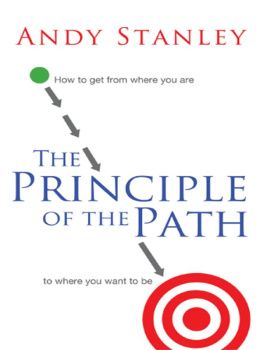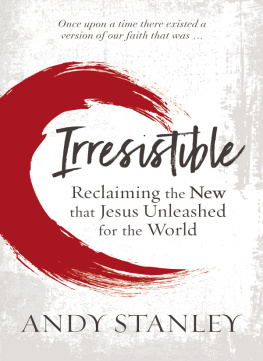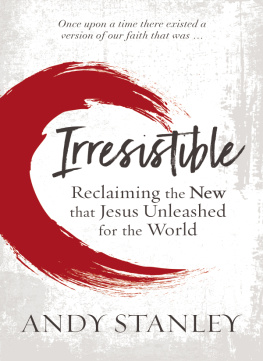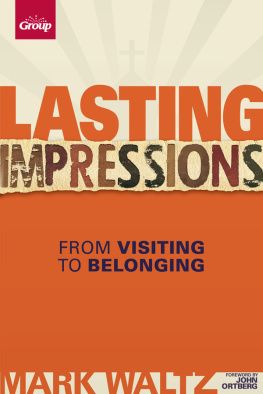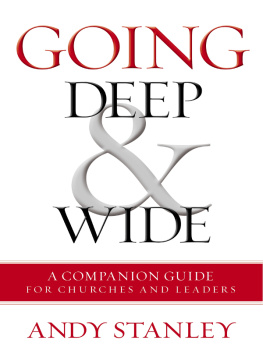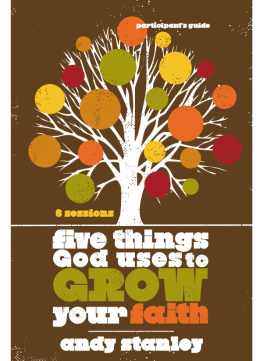Blessed is the man who gets the opportunity to devote his life to something bigger than himself and who finds himself surrounded by friends who share his passion. In this way, I have been disproportionately blessed.
This is a book about creating churches that unchurched men, women, and children love to attend. Specifically, this is a book about how some friends and I have gone about creating those kinds of churches. This isnt all there is to know on the subject. This is just all we know. As leaders, we are never responsible for filling anyone elses cup. Our responsibility is to empty ours. So for the next three hundredplus pages, Im going to pour out every drop on the subject of creating churches unchurched people love to attend.
Before we dive into the content, however, there is something you should know about me. Im not enamored with big. Ive always attended and worked in big churches. In elementary school our family attended a large church in Miami, Florida. During middle school and high school, I attended the largest church in Atlanta. During graduate school, I interned at one of the largest churches in Texas. Texas! Besides that, Im a preachers kid (PK). It takes a lot to impress us preachers kids. If you are a PK, you know exactly what I mean.
Preachers kids who gravitate toward ministry are commodities. I hire all I can. We see church differently than everybody else. We see it all from the inside out. We know that when people say they felt the Spirit moving, it probably means the room was full and the music was good. We know that what goes on at home is the litmus test of a man or womans walk with God, not how well he or she does once a microphone is strapped on. We know the difference between giftedness and godliness. We know the two can be mutually exclusive. We know that the best performers usually build the biggest churches but not necessarily the healthiest ones. We arent impressed with moving lights, slick presentations, God told me, the Spirit led me, or long prayers. Heck, all the men Ive known who impressed everybody with their long, animated, public prayers had moral problems. Thats why I pray short prayers. Im afraid there might be a correlation. Actually, I think Jesus said something about that. So this isnt a book about how to make your church bigger. You dont need me for that. If bigger is your goal, just start promising things in Jesus name. Religious people love that stuff.
This is a book about how to make your church more appealing to the people who are put off by all the shenanigans that give church, big churches in particular, a bad name people who know theres more to life than this life but who cant imagine that the church holds any clues. And in case you are wondering, yes, I think every church should be a church irreligious people love to attend. Why? Because the church is the local expression of the presence of Jesus. We are his body. And since people who were nothing like Jesus liked Jesus, people who are nothing like Jesus should like us as well. There should be something about us that causes them to gather at the periphery and stare.
Im often asked if Im surprised at how big North Point has grown. When its church leaders who ask, I assure them Im not. Heres why. When we launched North Point, every other church in Atlanta was competing for the churched people market. We decided to get into the unchurched people market. Thats a much larger market and we didnt have any competition at the time. If somebody liked our brand, we were the only option. If somebody wanted to bring an unchurched friend or family member to church, we were the logical destination. We werent any better than the other churches in town. We were just the only church designed from the ground up to capture the imaginations of unchurched people. Lets face it, if you have the only hot dog stand in town, your hot dogs dont have to be that good.
As I will discuss in detail later, our ongoing challenge is to make sure we stay in the unchurched people market. Thats not easy. Now that were so big, its not even necessary. Who would know? Who would care? Truth is, only our core would know. But we would all quit if we thought that staying meant spending the rest of our productive lives running a big church rather than making a big difference.
F ACT F INDING
As you will discover, we are a bit paranoid about the prospect of unintentionally becoming a church for churched people. So we are constantly looking for ways to discover whos coming, who invited them, whos sticking, and whos not. Like you, we love stories. But anecdotal evidence is hardly evidence. Youve been around the local church long enough to know that you can find a story to support just about any idea. Even bad ideas. Especially bad ideas. So while we celebrate stories of life change, we continue to look for ways to gather hard data on whether we really are a church unchurched people in our various communities love to attend.
Fortunately for us, there is a gentleman in our church, Brian Kaznova, who has helped us tremendously in this area. For the past several years, Brian has invested in our organization by designing surveys and then providing objective analysis and recommendations based on the findings. Brian has extensive experience with private corporations consulting on performance and organizational excellence. Several of the companies hes worked with were winners of the Malcolm Baldrige Award. One of the tools Brian created for us is a survey we distribute two or three times a year in our weekend services. Appendix A contains the actual survey card we use as well as a sampling of how the results are tallied. The magic of this particular tool is that it allows us to capture information from both regular attendees and those who have attended five times or less.
According to our survey, 40 percent of the regular attendees in our adult worship environments describe themselves as unchurched before they began attending our church (we define unchurched as not having attended a church for five years or longer). On any given weekend, 10 percent of our adult audiences identify themselves as guests (a guest being someone who has attended five times or less). Over 40 percent of that group identify themselves as unchurched as well. One of the things we are most interested in is how easy we are making it for our attendees to invite guests. Over 83 percent of our regular attendees marked that they have invited at least one person to church in the past twelve months. The satisfaction level always hovers around the 97 percent range with both regular attendees and guests. According to Brian, our responses are three to four times the numbers necessary to get an accurate read.


